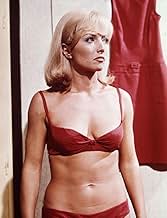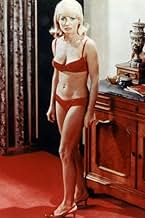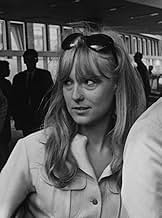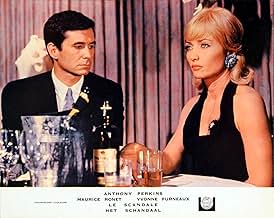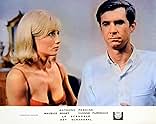अपनी भाषा में प्लॉट जोड़ेंA champagne tycoon's (Furneaux) partner (Ronet) suspects his partner's gigolo husband (Perkins) of murders he's been framed for.A champagne tycoon's (Furneaux) partner (Ronet) suspects his partner's gigolo husband (Perkins) of murders he's been framed for.A champagne tycoon's (Furneaux) partner (Ronet) suspects his partner's gigolo husband (Perkins) of murders he's been framed for.
- पुरस्कार
- कुल 1 जीत
Henri Attal
- Attacker in Dark Coat
- (बिना क्रेडिट के)
Robert Burnier
- General at Evelyn's Party
- (बिना क्रेडिट के)
Colin Drake
- Evelyn's Party Guest
- (बिना क्रेडिट के)
Pierre Gualdi
- Bishop at Evelyn's Party
- (बिना क्रेडिट के)
Raoul Guylad
- Customer at Denise's Shop
- (बिना क्रेडिट के)
Catherine Langeais
- Evelyn's Party Guest
- (बिना क्रेडिट के)
Denise Péronne
- Party Guest Who Had Met Christopher
- (बिना क्रेडिट के)
फ़ीचर्ड समीक्षाएं
This bizarre but intriguing opus from what is traditionally referred to as his 'fallow' period, turns out to be the template for most of Claude Chabrol's subsequent output. He is often compared to Alfred Hitchcock and ironically this film has been made for Universal Studios which accounts for the presence of Anthony Perkins from 'Psycho' and Henry Jones from 'Vertigo'. It is to be lamented that the dubbed American version has been cut by about seven minutes so as to blunt the sexual aspects, not least the homoerotic element between Christopher and Paul.
Although not quite as polished and well-crafted as his later films in this genre there are some stylistic flourishes not least the showy overhead final shot and is eminently watchable thanks to its talented and attractive leading players. Anthony Perkins in his first of two films for this director, employs his boyish charm and inherent quirkiness to fullest effect whilst Maurice Ronet's performance as the supposedly deranged Paul is a veritable tour de force and arguably one of his finest. On the distaff side is the fabulously feline Yvonne Furneaux whilst Chabrol's wife Stéphane Audran assumes a greater importance here in a double role and would soon take centre stage in his mid-period masterpieces. Slinky Suzanne Lloyd plays Sylvie whose lengthy scene with Ronet is one of Chabrol's most surreal.
Chabrol's 'A' Team is very much in evidence here in terms of the glossy cinematography of Jean Rabier, taut editing by Jacques Gaillard, incisive dialogue by Paul Gégauff and score by Pierre Jansen which on this occasion is alas somewhat intrusive.
This film, for this viewer at any rate, is very much 'work in progress' but displays a refinement of technique that over the next few years would establish Chabrol's reputation as an acknowledged master of the psychological thriller.
Although not quite as polished and well-crafted as his later films in this genre there are some stylistic flourishes not least the showy overhead final shot and is eminently watchable thanks to its talented and attractive leading players. Anthony Perkins in his first of two films for this director, employs his boyish charm and inherent quirkiness to fullest effect whilst Maurice Ronet's performance as the supposedly deranged Paul is a veritable tour de force and arguably one of his finest. On the distaff side is the fabulously feline Yvonne Furneaux whilst Chabrol's wife Stéphane Audran assumes a greater importance here in a double role and would soon take centre stage in his mid-period masterpieces. Slinky Suzanne Lloyd plays Sylvie whose lengthy scene with Ronet is one of Chabrol's most surreal.
Chabrol's 'A' Team is very much in evidence here in terms of the glossy cinematography of Jean Rabier, taut editing by Jacques Gaillard, incisive dialogue by Paul Gégauff and score by Pierre Jansen which on this occasion is alas somewhat intrusive.
This film, for this viewer at any rate, is very much 'work in progress' but displays a refinement of technique that over the next few years would establish Chabrol's reputation as an acknowledged master of the psychological thriller.
French actor Maurice Ronet ("Purple Noon") is front and centre here as Paul Wagner, a free-spirited playboy. He is pressured by Christine Belling (Yvonne Furneaux, "Repulsion"), the wife of his good friend Christopher Belling (Anthony Perkins of "Psycho" fame), to sell his champagne business to American interests. (Represented by character actors Henry Jones ("The Bad Seed") and George Skaff ("Topaz").) But complicating matters is the fact that after Paul emerges from drunken stupors, dead female bodies are found in his vicinity. Since he hasn't been quite right since an incident in the films' opening business, he worries that he's losing his mind once again.
Critics weren't overly kind to this psychological thriller from French filmmaker Claude Chabrol, feeling that the plot was simply too convoluted. But, in truth, it's not all *that* complex, and it does have surprises in store for the viewer, including the ultimate identity of the killer, revealed to be a VERY ruthless sort. The film is extremely well shot in Technovision by Jean Rabier, and features a pleasant score by Pierre Jansen. It's noteworthy for being rather irreverent, and Chabrol gets an uncharacteristic, amusingly comic turn out of Perkins. This is the loosest that this viewer has ever seen the actor. Ronet, playing the one character in "The Champagne Murders" worthy of some sympathy, does a very effective job, but the film truly belongs to a fantastic Stephane Audran ("Babette's Feast") as the secretary.
Commendably, Chabrol may end this with the expected confrontation between principal characters, but dares to prevent the audience from feeling total satisfaction by ending the film without a true resolution.
Written by American film critic Derek Prouse and French screenwriter Claude Brule ("Barbarella"), based on an idea by William Benjamin; the dialogue for the French-language version was scripted by Paul Gegauff. This was the first of two pictures that Perkins acted in for Chabrol; the second was "Ten Days Wonder".
Seven out of 10.
Critics weren't overly kind to this psychological thriller from French filmmaker Claude Chabrol, feeling that the plot was simply too convoluted. But, in truth, it's not all *that* complex, and it does have surprises in store for the viewer, including the ultimate identity of the killer, revealed to be a VERY ruthless sort. The film is extremely well shot in Technovision by Jean Rabier, and features a pleasant score by Pierre Jansen. It's noteworthy for being rather irreverent, and Chabrol gets an uncharacteristic, amusingly comic turn out of Perkins. This is the loosest that this viewer has ever seen the actor. Ronet, playing the one character in "The Champagne Murders" worthy of some sympathy, does a very effective job, but the film truly belongs to a fantastic Stephane Audran ("Babette's Feast") as the secretary.
Commendably, Chabrol may end this with the expected confrontation between principal characters, but dares to prevent the audience from feeling total satisfaction by ending the film without a true resolution.
Written by American film critic Derek Prouse and French screenwriter Claude Brule ("Barbarella"), based on an idea by William Benjamin; the dialogue for the French-language version was scripted by Paul Gegauff. This was the first of two pictures that Perkins acted in for Chabrol; the second was "Ten Days Wonder".
Seven out of 10.
Curiously uninvolving despite fine cast and several memorable scenes of bourgeois grotesquerie accompanied by vaguely Hitchcockian touches. The English dubbing didn't help.
In France, the friends Paul Wagner (Maurice Ronet) and Christopher "Chris" Belling (Anthony Perkins) take a prostitute in their sport car and go to a park. Out of the blue, they are attacked by thieves and Paul is hit on the windshield and has a serious head injury. The woman is strangled by the attackers. Paul spends one year at a clinic to recover and Christopher's wife Christine Belling (Yvonne Furneaux) with the support of her secretary Jacqueline (Stéphane Audran) administrate Paul's family business of Wagner champagne. When Paul is recovered, he is different and Christine wants to cheat on him and sell his business, but Paul refuses the deal. Chris expects that Christine buys a yacht for him, if she succeeds. Paul travels with Christopher to Hamburg in a business trip and he recalls when Chris was a rent boy and Paul introduced him to the wealthy Christine. During the night, Paul goes to a restaurant, gets drunk, goes to a park with the prostitute Paula (Christa Lang) and faints. Later the police find Paula strangled in the morning. When Christine receives an anonymous letter about the murder of the woman, she blackmails Paul that is amnestic. When he goes to the party of the artist Evelyn Wharton (Suzanne Lloyd), Paul drinks too much and when he wakes up, Evelyn is strangled by his side. Is Paul a serial-killer?
"Le scandale" (1967), a.k.a "The Champagne Murders" is a movie by Claude Chabrol about a strangler of women that may be or not a wealthy owner of champagne business. The behavior of the lead characters misguides the viewer, since they have no moral compass. Paul is a futile heir; Christopher is a former rent boy, and Christine is totally unethical in business. When the real identity of the murderer is disclosed, the viewer will certainly have a surprise. The open end is a trademark of Chabrol to force the viewer to think and discuss his movie. My vote is seven.
Title (Brazil): "O Escândalo" ("The Scandal")
"Le scandale" (1967), a.k.a "The Champagne Murders" is a movie by Claude Chabrol about a strangler of women that may be or not a wealthy owner of champagne business. The behavior of the lead characters misguides the viewer, since they have no moral compass. Paul is a futile heir; Christopher is a former rent boy, and Christine is totally unethical in business. When the real identity of the murderer is disclosed, the viewer will certainly have a surprise. The open end is a trademark of Chabrol to force the viewer to think and discuss his movie. My vote is seven.
Title (Brazil): "O Escândalo" ("The Scandal")
Spoiler alert: this review is all spoilers. But this movie is so bad that I don't think it's possible to spoil it any further. A reviewer who has praised the movie asserts that the Anthony Perkins character, Christopher, is in cahoots with the character, or rather characters, played by Stéphane Audran: Audran is Jacqueline when disguised as Christopher's mousy maid and she is the flashy Lydia when not in disguise. Lydia commits a bunch of murders and tries to pin them on Christopher's friend, the character named Paul who is played by Maurice Ronet. Lydia's plan is to benefit financially from the deaths of her murder victims and then live happily ever after with Christopher (why the beautiful and intelligent, albeit ruthless, Lydia would kill in order to be with a loser like Christopher is beyond my comprehension). But if Christopher is in on Lydia's plan, then the scene where he makes a play for Jacqueline and she rejects him makes no sense. Perhaps he could be in cahoots only with Lydia, not realizing that she is also Jacqueline, but that would mean that all it takes for a woman to deceive Christopher is not much more than her wearing of a wig. Christopher's being in cahoots with Lydia would also mean that he would be delighted when he learns that his wife, Christine, played by Yvonne Furneaux, has been murdered, when in fact he is distraught. The entire movie makes very little sense. With the partial exception of Christine, all the main characters are unprincipled and obnoxious people, so it is difficult to have much sympathy for any of them.
क्या आपको पता है
- ट्रिवियाClaude Chabrol made this film for an American company, Universal, and with some American and British actors in prominent roles. Each scene for the film was filmed in both French and English versions, with the result that it got widely released in Britain and America. The English-language version was mostly scripted by the veteran British film critic Derek Prouse. Chabrol, who spoke excellent English, was able to maintain complete artistic control over the project.
- भाव
Christopher: [to Christine who is trying to seduce him] I'm sorry darling. I don't really feel too well. I'm tired. It's always like this when I haven't had enough television.
- कनेक्शनReferenced in Kill Bill: Vol. 1 (2003)
टॉप पसंद
रेटिंग देने के लिए साइन-इन करें और वैयक्तिकृत सुझावों के लिए वॉचलिस्ट करें
- How long is The Champagne Murders?Alexa द्वारा संचालित
विवरण
- रिलीज़ की तारीख़
- कंट्री ऑफ़ ओरिजिन
- भाषा
- इस रूप में भी जाना जाता है
- Le Scandale
- फ़िल्माने की जगहें
- Atlantic Hotel, St. Georg, हैम्बर्ग, जर्मनी(Hotel where Wagner's stays.)
- उत्पादन कंपनी
- IMDbPro पर और कंपनी क्रेडिट देखें
- चलने की अवधि
- 1 घं 45 मि(105 min)
- ध्वनि मिश्रण
- पक्ष अनुपात
- 2.35 : 1
इस पेज में योगदान दें
किसी बदलाव का सुझाव दें या अनुपलब्ध कॉन्टेंट जोड़ें

